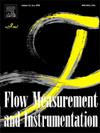Development and experimental testing of an innovative nondestructive thermal sensor utilizing the thermal interrogation method for detecting leakage in water plastic pipes
Abstract
Leak detection in water pipelines is still an important issue in real-world industrial systems. Thus, a new nondestructive thermal sensor design based on the thermal interrogation method has been developed to detect and estimate the real-time leaks in water plastic pipes without environmental interference. The proposed thermal interrogation method utilizes a combination of heat flux and temperature measurements on the upstream and downstream outside plastic pipe surfaces. These measurements are obtained by using heat flux sensors and thermocouples that are covered by thin-film polyimide electric heaters. The interrogation method approach delivers that at constant input heat flux, the difference in sensor temperature values is dependent on the leakage volume flow rates. The sensor was tested over a range of water leakage volume flow rate from 0.1 m3/h to 1.3 m3/h and a range of water temperature from 21 °C to 25 °C. The water leakage volume flow rates were correlated to the difference in temperature values between the upstream and downstream sensors. The measurement results reveal that this sensor can be used to detect and estimate the real-time water leakage volume flow rate with high accuracy and repeatability for plastic pipes.

 求助内容:
求助内容: 应助结果提醒方式:
应助结果提醒方式:


